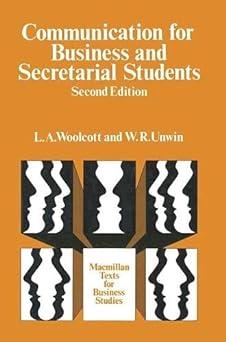In about 160 words summarise the benefactions conferred by advertising, and the reasons for the 'periodic qualms
Question:
In about 160 words summarise the benefactions conferred by advertising, and the reasons for the 'periodic qualms of the advertising man' described in the following passage. Give your summary a suitable heading.
No one doubts that advertising has done much to raise the standards of physical wellbeing. The catalogue of its benefactions, real and claimed, is a long one. It has speeded the introduction of useful inventions to a wide as distinct from a select circle. It has brought prosperity to communities which did not know how to sell their rotting crops. By widening markets, it has enabled costs of raw materials to be cut, accelerated turnover, lowered selling prices. It has spread seasonal trade and kept people in employment. It has given a guaranteee of dependability- for who (as that advertisement used to ask) would buy a nameless motorcar put together in a back-street workshop? Its defenders claim that advertising has abolished heavy underwear, made people clean their teeth (which was more than the dentists could persuade them to do), and made them Nice to be Near. These gratifying results have been achieved, not only by informative, but by persuasive and indeed by intimidating advertisements. The prime object of the exercise was not, of course, to benefit humanity but to sell more fabrics, more toothpaste, more disinfectant ..
Not least important, advertising is also the buttress of a free and cheap press, which otherwise would exist only by the conditional subventions of governments, parties and pressure groups. It is also the provider of free radio and television entertainment. for millions daily.
Here, the prime object may not be to entertain, but to sell goods; yet millions are reasonably satisfied with and grateful for the fare they provide.
Perhaps the periodic qualms of the advertising men spring from the knowledge - as Professor J. K. Galbraith has hinted - that the keenest brains are employed to sell fringe commodities which fulfil no urgent need, but which do something to lighten the rat race for which advertising is in some measure responsible - goods like tobacco, liquor, drugs, sweets and gum. In .a prosperous society there comes a point, as the professor indicates, when advertising no longer rewards the community with lower prices and greater efficiency. The manufacturer in a competitive market cannot conquer by price-cutting, for that way lies suicide; all he can do is to battle expensively, ingeniously, and perhaps unscrupulously for a bigger share of the existing market .. This is unlikely to be achieved by a calm presentation of the facts about his product, or by a plea for loyalty, but it can be done by a variety of tricks, among which is to invest the product with subjective qualities -
offering romance with chocolates, poise with perfume, popularity with dance lessons, social prestige with motor-cars. In Shepherd Meade's 'The Admen' (1958) a character says that toothpaste presents the real chal lenge to the advertiser, since there is not enough difference between one brand and another 'to put in your eye'. The same could be said of many cigarettes, most whiskies, nearly all petrols. Somehow the advertising man must persuade the public that his brand is di(ferent, or more desirable; and if he does not do so, factories are going to close down and agencies disappear. He must find what arguments he can to solace his conscience. If, for example, it is ethical for doctors to prescribe useless medicines, with a purely psychological value (placebos) why is it unethical to sell a sound product by investing it with a fanciful appeal?
(E. S. Turner, The Shocking History of Advertising)
Step by Step Answer:

Communication For Business And Secretarial Students
ISBN: 9780333148679
2nd Edition
Authors: Lysbeth A Woolcott






